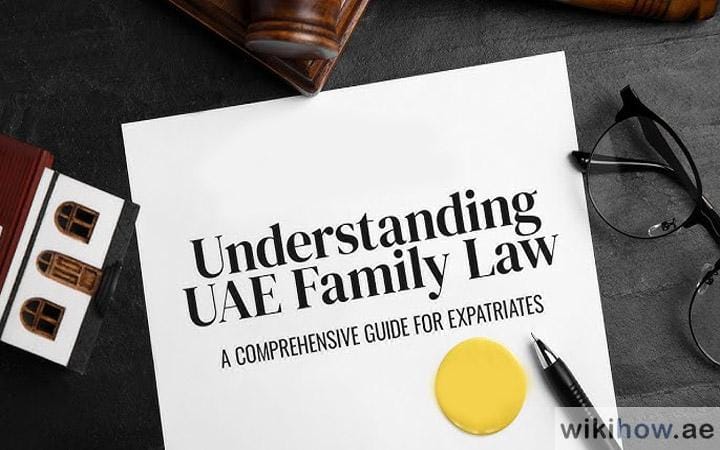Understanding UAE Family Laws and Regulations in 2026

The UAE places a high value on families, and the laws that regulate them are extensive and constantly changing. The UAE family laws and regulations reflect the country’s unique blend of Islamic traditions and modern global standards.. Knowing these laws is crucial for defending your rights and handling family issues lawfully, whether you’re a local or an expat. Stay with us throughout this article to fully examine these regulations.
UAE Family Law’s Legal Framework
The UAE legal system is based on civil law principles, Sharia law, and recently passed secular codes for non-Muslims. Federal Law No. 28 of 2005 (Personal Status Law) has traditionally governed Muslim family matters; however, new laws passed in 2021 and 2023 provide non-Muslim residents with secular alternatives.
For instance, equal custody rights, civil marriages and no-fault divorces are all permitted under Abu Dhabi’s Non-Muslim Personal Status Law (Federal Decree-Law No. 41 of 2022). These evolving legal provisions also influence procedures related to how to sponsor family members in UAE, ensuring that expats can navigate personal matters in alignment with the law.

Marriage Laws in the UAE
A couple must meet specific requirements based on their nationality and religion in order to be married in the United Arab Emirates. Muslim couples must marry in line with Sharia law in UAE courts, while non-Muslim couples can opt to marry under the laws of their home country or through the Abu Dhabi Civil Court, which allows civil marriages without religious ceremonies. Interfaith marriages are generally accepted if the groom is Muslim and the bride belongs to a monotheistic faith, such as Christianity or Judaism. The legal marriage age is 18 Hijri, and anyone under 21 must have parental consent before getting married. Recent reforms that have facilitated civil marriage, particularly in Abu Dhabi, are a reflection of the UAE’s broader efforts toward modernization and inclusivity in family matters. To better understand these regulations, couples are encouraged to review the full scope of Marriage Laws in UAE, which provide detailed guidance for both locals and expatriates.

Divorce Laws and Grounds for Divorce
UAE divorce laws provide both amicable and difficult routes to separation, depending on the particulars and the parties’ respective religious backgrounds. In a mutual divorce, both spouses agree to dissolve their marriage amicably, but in a contested divorce, one spouse files for divorce on the grounds of abuse, neglect, or harm. Muslim couples’ divorce proceedings are governed by sharia law, which usually requires mediation and supporting documentation. In contrast, non-Muslim couples can use secular civil courts, especially in Abu Dhabi, where new laws allow no-fault divorces, which make it simpler and more accessible for either party to end the marriage without having to provide evidence of wrongdoing.
Rules Regarding Child Custody
The UAE has seen a major change in child custody in recent years:
- Traditionally, mothers had custody until the age of eleven for boys and thirteen for girls.
- Abu Dhabi’s new laws, which prioritize the needs of the children, permit joint custody.
- With some leeway for exceptions, courts put the child’s best interests first.
Fathers usually continue to act as the child’s legal guardians, handling their finances and making important choices.
Recent Reforms and Modernization in UAE Family Laws
The UAE has seen a number of reforms between 2021 and 2026:
- Decriminalization of adultery and cohabitation
- establishment of non-Muslim civil marriage systems
- More transparent laws governing inheritance and child custody
- Equal rights under Abu Dhabi’s civil law with regard to divorce and custody
By implementing these changes, the UAE hopes to become more welcoming to foreigners and conform to global norms. They also complement immigration policies related to obtaining a family visa in UAE, helping residents sponsor and reunite with their loved ones more efficiently.
Domestic Violence and Legal Protections
Federal Law No. 10 of 2019 provides strong legal protections for victims of domestic violence and treats it as a serious criminal offense in the United Arab Emirates. The law guarantees access to support services like shelters and emergency hotlines, permits the issuance of protection orders and punishes offenders severely. Throughout the Emirates, there are specialized family protection units that offer women and children prompt aid, legal advice and psychological support to guarantee their safety and defend their legal rights.
Inheritance and Wills Under UAE Law
Inheritance laws in the United Arab Emirates vary according to an individual’s religion. Muslim residents are subject to sharia-based inheritance laws, which set fixed shares for heirs. Non-Muslims have the option to draft their wills in accordance with their home country’s laws or register them with the DIFC Wills Center to ensure that their assets are distributed as they see fit. Formalizing estate plans in advance is essential because, should a will not be registered, Sharia succession rules will be applied automatically by UAE courts, which may not reflect the wishes of the deceased.

Family Law for Non-Muslim Residents
The 2022 Federal Civil Law created a unique legal framework for non-Muslim residents of the United Arab Emirates with respect to significant personal matters such as civil marriage, no-fault divorce, joint child custody, and equal inheritance rights. This modern system, which is mostly utilized in Abu Dhabi, streamlines family law processes through the use of bilingual Arabic and English documentation. By providing non-Muslim expatriates with a more approachable and inclusive way to settle family-related disputes, it demonstrates the UAE’s commitment to legal diversity and global best practices.
Adultery and Morality Laws in the UAE
The decriminalization of cohabitation and adultery, which were once crimes in the United Arab Emirates, for consenting adults represents a significant step toward legal modernization. Despite this change, public offenses are still punishable by law, and public decency laws remain in effect. Furthermore, even though adultery is no longer punishable by law, it can still influence family court rulings, particularly those pertaining to child custody or alimony. These reforms reflect the UAE’s ongoing efforts to balance cultural values with an inclusive, forward-thinking legal system.
Conclusion
To guarantee that personal and family matters are handled legally and equitably, it is crucial for both citizens and foreigners to comprehend UAE family laws and regulations. With a variety of legal pathways catered to various nationalities, faiths, and family structures, the United Arab Emirates has made great progress toward legal modernization. The country’s progressive vision is reflected in the changing legal landscape, which includes equal custody rights, improved protections against domestic violence, civil marriage and no-fault divorce for non-Muslims. Families in the UAE can safeguard their rights, promote stability and make informed decisions for their future by remaining informed and obtaining legal counsel when necessary.
WikiHow continues to be one of the most thorough and current sources of information and news about the United Arab Emirates for individuals looking for continuous updates and the most trustworthy insights on legal developments.
FAQs
1. Can expatriates legally marry in the UAE?
Yes, expatriates can marry either through their embassy or, for non-Muslims, via the Abu Dhabi Civil Court under the 2022 Federal Civil Law.
2. How is child custody handled in UAE courts?
Custody is often granted to mothers, while fathers remain legal guardians. However, new laws allow for joint custody, particularly under Abu Dhabi’s civil system.
3. What happens to inheritance if a non-Muslim dies without a will in the UAE?
If no registered will exists, Sharia law will be applied by default. Non-Muslims can avoid this by registering a will through legal channels like the DIFC Wills Centre.






Nice post. I was checking continuously this blog and I am impressed! Extremely useful info particularly the last part 🙂 I care for such info a lot. I was looking for this particular information for a long time. Thank you and best of luck.
Thank you for your kind words! We’re glad the information was helpful and exactly what you were looking for wishing you all the best as well!